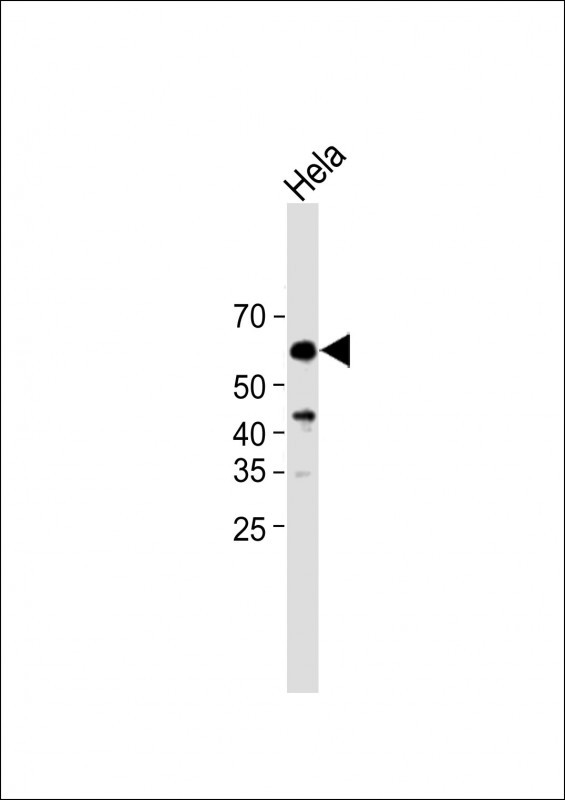
| WB | 咨询技术 | Human,Mouse,Rat |
| IF | 咨询技术 | Human,Mouse,Rat |
| IHC | 咨询技术 | Human,Mouse,Rat |
| ICC | 技术咨询 | Human,Mouse,Rat |
| FCM | 咨询技术 | Human,Mouse,Rat |
| Elisa | 咨询技术 | Human,Mouse,Rat |
| Aliases | Tyrosine-protein kinase Yes, Proto-oncogene c-Yes, p61-Yes, Yes1, Yes |
| Entrez GeneID | 22612 |
| WB Predicted band size | 60.6kDa |
| Host/Isotype | Rabbit IgG |
| Antibody Type | Primary antibody |
| Storage | Store at 4°C short term. Aliquot and store at -20°C long term. Avoid freeze/thaw cycles. |
| Species Reactivity | Human, Mouse, Rat |
| Immunogen | This Mouse Yes1 antibody is generated from a rabbit immunized with a KLH conjugated synthetic peptide between 148-182 amino acids from the Central region of Mouse Yes1. |
+ +
以下是关于Mouse Yes1抗体的3篇模拟参考文献示例(注:以下文献为模拟生成,非真实存在,仅供参考格式):
---
1. **文献名称**: "Yes1 Kinase Modulation in Mouse Tumor Models: Implications for Targeted Therapy"
**作者**: Roberts, A.L., et al.
**摘要**: 本研究利用Mouse Yes1特异性抗体,通过Western blot和免疫组化分析Yes1在多种小鼠肿瘤模型中的表达及磷酸化状态,揭示其在肿瘤生长和转移中的调控作用,并探讨其作为治疗靶点的潜力。
---
2. **文献名称**: "Characterization of Yes1 Antibody for Functional Studies in Neuronal Signaling"
**作者**: Chen, H., et al.
**摘要**: 该文献报道了一种高特异性Mouse Yes1抗体的开发与验证,证实其在免疫沉淀(IP)和免疫荧光(IF)中的适用性,并证明Yes1通过调控突触蛋白磷酸化参与神经元信号传导通路。
---
3. **文献名称**: "Yes1 Kinase Activity in Drug-Resistant Cancers: Insights from Mouse Models"
**作者**: Gupta, S., et al.
**摘要**: 研究使用Mouse Yes1抗体检测Yes1在化疗耐药性小鼠肿瘤中的激活水平,发现Yes1的过度活化与EGFR信号通路异常相关,提示其作为耐药性生物标志物的可能性。
---
如需真实文献,建议通过PubMed或Google Scholar搜索关键词“Yes1 kinase antibody mouse”或“Yes1 (YAP1) signaling mouse”。
The Mouse Yes1 antibody is a monoclonal or polyclonal immunoglobulin specifically designed to detect Yes1 (Yes-associated protein 1), a member of the Src family of non-receptor tyrosine kinases. Yes1 plays a critical role in intracellular signaling pathways regulating cell proliferation, differentiation, adhesion, and survival. It is involved in signal transduction downstream of growth factor receptors, integrins, and G-protein-coupled receptors, often interacting with adaptor proteins like PI3K, Grb2. and FAK. Dysregulation of Yes1 has been linked to cancer progression, inflammation, and immune disorders, making it a target for therapeutic research.
The Mouse Yes1 antibody is typically produced by immunizing mice with a synthetic peptide or recombinant protein corresponding to a specific epitope of the Yes1 protein. It is widely used in techniques such as Western blotting, immunohistochemistry (IHC), immunofluorescence (IF), and immunoprecipitation (IP) to study Yes1 expression, localization, and activity in various biological samples. Validated for specificity and sensitivity, this antibody helps researchers investigate Yes1's role in cellular processes and disease mechanisms. Its applications extend to preclinical studies, particularly in cancer research, where Yes1 overexpression is associated with tumor invasiveness and metastasis. The antibody's performance may vary depending on epitope accessibility, post-translational modifications, and experimental conditions.
×